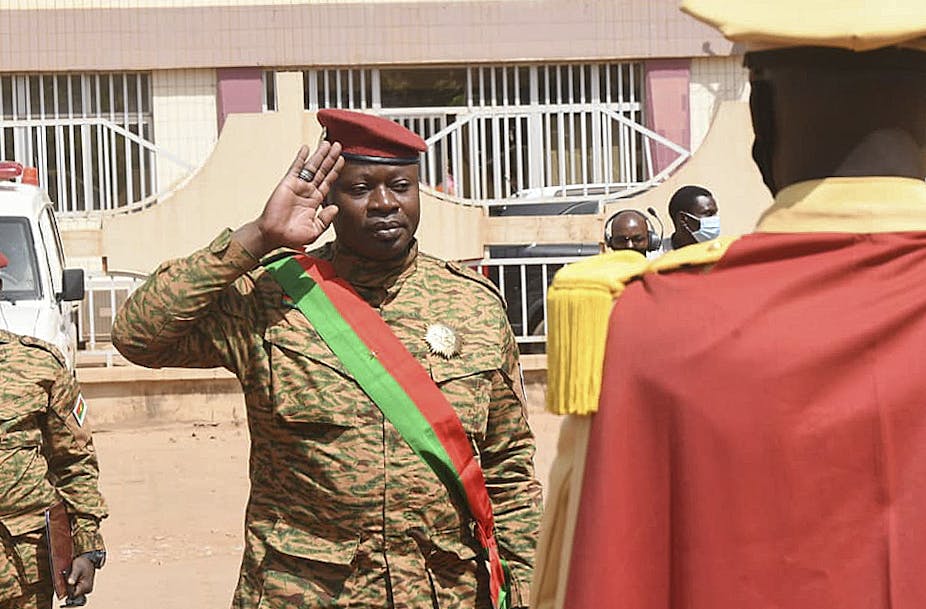Mali. Guinea. Burkina Faso. Military juntas in West Africa have seized power in a series of coups in recent months. In this episode of The Conversation Weekly, we ask security experts what the coups mean for the war against jihadi insurgents in the Sahel – and for the presence of French and European soldiers in the region.
And, we talk to a psychologist who’s been trying to find ways to alleviate the discrimination faced by people who speak English with a foreign accent.
The French military intervention in Mali began in 2013 when the government requested help to fight an Islamist insurgency that threatened the capital Bamako. French troops have been in Mali ever since as part of Operation Barkhane, a regional mission to fight jihadist groups across the Sahel.
But two military coups in Mali, in August 2020 and then May 2021, severely strained the relationship between Mali and France. Mali expelled the French ambassador in early February 2022 and a war of words ensued. On February 17, France announced it would withdraw its troops from Mali, although it plans to continue fighting the insurgency from neighbouring countries. The European Union’s special forces Takuba taskforce in the region also announced its withdrawal from Mali.
France and the EU have limited options for regional military partners in the Sahel. In September 2021, Guinea’s President Alpha Condé was also deposed in a military coup, and then in January 2022, Burkina Faso’s President Roch Kaboré was overthrown by a military junta. People took to the streets to celebrate the military takeovers in both Guinea and Burkina Faso.
“Those coups are very problematic,” says Thierry Vircoulon, a researcher at the University of Paris in France and an associate research fellow at the French Institute of International Affairs think tank. Vircoulon predicts the departure of French troops will lead to “a deterioration of the security situation,” both in Mali and elsewhere in the Sahel. Attacks have already spread into neighbouring countries, such as Benin.
“The conflict is expanding and it’s also becoming more and more complicated with more and more entrepreneurs of violence with very different backgrounds,” says Vircoulon. “It’s not only a counter terrorism war, it’s also a civil war, a conflict for resources, and a war between trafficking networks.”
Mady Ibrahim Kanté is a lecturer at the University of Legal and Political Sciences of Bamako in Mali. He says he’s heard frustration at the French presence in Mali first hand from local people during a number of research visits to the north of the country. “They haven’t been able to protect the population,” says Kanté. “A number of villages have been completely destroyed by the terrorists that were not very far from military bases, whether that’s a French military base from Operation Barkhane, or one from the G5 Sahel force (a regional military coalition between Mali, Mauritania, Burkina Faso, Niger and Chad).”
According to the Africa Center for Strategic Studies, the number of attacks increased 70% between 2020 and 2021. An estimated 2.4 million people have been displaced during the years of conflict.
Folahanmi Aina, a PhD candidate in leadership studies at King’s College London in the UK, says the jihadist insurgencies in the region “revealed the fragility of these states” and their “inability to provide protection and security for their citizens.” Aina says the military has capitalised on this vacuum. “As long as jihadism remains prevalent across the region, there’s every tendency for the military to use this as a justification for acquiring and seizing political power under the guise of being guardians of the state,” he warns.
Read more: Mapping the contours of Jihadist groups in the Sahel
In our second story in this episode, we hear about new research searching for ways to alleviate discrimination faced by people who speak English with a foreign accent. Studies show native English speakers rate salespeople as less knowledgeable and convincing if they have an accent, and employers can overlook people with accents during hiring or promotion decisions. Shiri Lev-Ari, a lecturer in psychology at Royal Holloway University of London in the UK, and her colleagues ran experiments to reduce the bias against non-native speakers. She tells us what they found. Listen from 31m40s.
Read more: Here’s why people might discriminate against foreign accents – new research
And Jack Marley, an environment editor for The Conversation in Newcastle, England, recommends some recent articles on the ethical questions raised by eating meat. Listen from 43m40s.
This episode of The Conversation Weekly was produced by Mend Mariwany and Gemma Ware, with sound design by Eloise Stevens. Our theme music is by Neeta Sarl. You can find us on Twitter @TC_Audio, on Instagram at theconversationdotcom or via email. You can also sign up to The Conversation’s free daily email here.
Newsclips in this episode are from Boima TV, Al Jazeera English, Reuters, France 24 English and RFI.
You can listen to The Conversation Weekly via any of the apps listed above, download it directly via our RSS feed, or find out how else to listen here.

